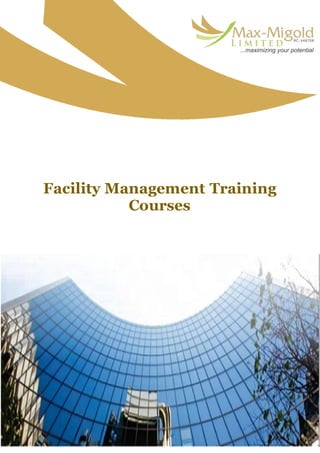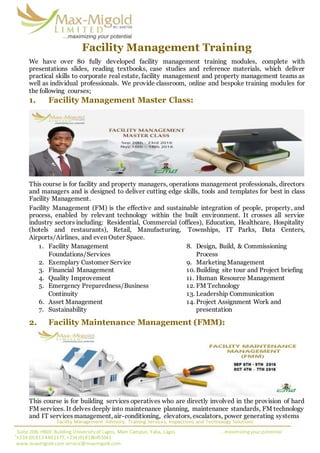Max-Migold FM Training
- 2. Facility Management Training We have over 80 fully developed facility management training modules, complete with presentations slides, reading textbooks, case studies and reference materials, which deliver practical skills to corporate real estate, facility management and property management teams as well as individual professionals. We provide classroom, online and bespoke training modules for the following courses; 1. Facility Management Master Class: This course is for facility and property managers, operations management professionals, directors and managers and is designed to deliver cutting edge skills, tools and templates for best in class Facility Management. Facility Management (FM) is the effective and sustainable integration of people, property, and process, enabled by relevant technology within the built environment. It crosses all service industry sectors including: Residential, Commercial (offices), Education, Healthcare, Hospitality (hotels and restaurants), Retail, Manufacturing, Townships, IT Parks, Data Centers, Airports/Airlines, and even Outer Space. 1. Facility Management Foundations/Services 2. Exemplary Customer Service 3. Financial Management 4. Quality Improvement 5. Emergency Preparedness/Business Continuity 6. Asset Management 7. Sustainability 8. Design, Build, & Commissioning Process 9. Marketing Management 10.Building site tour and Project briefing 11. Human Resource Management 12. FM Technology 13. Leadership Communication 14. Project Assignment Work and presentation 2. Facility Maintenance Management (FMM): This course is for building services operatives who are directly involved in the provision of hard FM services. It delves deeply into maintenance planning, maintenance standards, FM technology and IT services management, air-conditioning, elevators, escalators, power generating systems
- 3. Maintenance and troubleshooting, as well as building wiring and electrical equipment maintenance and troubleshooting. 1. Work Methods Statements 2. Facility Maintenance Strategies 3. The Facility Maintenance Plan 4. Building Maintenance Standards 5. Building Fabric and Structure Maintenance 6. Air-conditioning Maintenance 7. Building Electrical System Maintenance 8. Information and Telecommunications Management 9. Facility Inspections and Action Worksheets 10. Facility Condition Assessments and Surveys 11. Health and Safety Management 12. Maintenance Records 13. Regulatory Requirements and Building Codes 14. Power Systems Maintenance 15. Elevators and Escalators Maintenance 16. Fire Fighting Equipment Maintenance 17. Plumbing Maintenance 18. Maintenance Automation 19. Project Management for Repairs 20. CAFM, CMMS, BIM and other FM Technologies 3. Asset Management & CMMS Workshop: This workshop is for managers that are accountable for the assets in their organizations. It thoroughly explores the theoretical and practical aspects of assets data collation, tagging, operational tracking and disposal of physical assets as well the effective use of computerized maintenance management systems (CMMS) for facility, property, maintenance and real estate’s portfolio management. This workshop covers Practical Assets Register creation and audit, conversion of the asset register into an operations and maintenance dashboard, Asset Lifecycle Management, Decommissioning/Proper Disposal/Replacement of Asset, Model Selection (Optimum replacement age, Repair/Replacement, Alternative Decision Making, Maintenance Strategy Selection or other uses), Computer Based Asset Monitoring, CMMS implementation and Challenges, CMMS Vs other FM systems. 4. Facility Management Operations (FMO): This course is for building services operatives who directly interface with building users, manage service providers, custodial, and maintenance teams.
- 4. The course covers key learning requirements for Building Managers including communication, emergency preparedness and business continuity, environmental stewardship and sustainability, finance and business, human factors, leadership and strategy, project management, quality management, real estate and property management and technology with a very strong focus on operations and maintenance. 1. Introduction to Facility Management Operations 2. Managing FM Stakeholder Communications 3. Assets Register 4. Finance and Business for Facility Management 5. Space Planning and Move Management 6. FM Reports and Records Keeping 7. Health and Safety Management 8. FM Contracts Execution and Monitoring 9. Regulatory Compliance 10. Assets Management 11. Managing Cleaning and Hygiene Services 12. Managing Gardening, Landscape and Waste Services 13. Managing Security Services 14. Managing Hospitality Services 15. Managing Indoor Environmental Quality 16. Utilities Management 17. Customer Service 18. Help Desk Management 19. FM Operations Planning and Control 20. Managing Workplace Services 5. FM Business and Finance Workshop: This workshop is for facility mangers, procurement managers and finance managers engaged in the built environment. It coversbudgeting, accounting fundamentals, cost concepts, procurement, Outsourcing and contracts. It is a workshop designed to tackle complex financial issues in facility Management such as cost reduction strategies, facility condition index monitoring, financial management metrics. 6. Facility Management Strategy (FMS): This course is for facilities, real estates and property department leaders, financial, procurement, general services and administrative heads who oversee budgets, strategic planning, and procurement of FM services, are concerned about cost optimization, strategic alignment with core business, building user productivity and workplace policy implementation. This course will treat
- 5. various FM contracting models, value-based FM contracting processes as well as FM organizational leadership. 1. FM Core Competencies 2. FM Department Organization Structures 3. FM Leadership and Strategy 4. Procurement in Facilities Management 5. Emergency Preparedness and Business Continuity 6. The Facility Master Plan and the Real Estate Master Plan 7. Types of Facility Management Contracts 8. Outsourcing in Facility Management 9. Facility Management Accounting Essentials 10. Sustainability and Environmental Stewardship 11. Integrated Facility Management 12. Health and Safety Management System 13. Corporate Social Responsibility 14. Stakeholder Management 15. FM Performance and Quality Management 16. FM Benchmarking 17. Real Estate and Property Management 18. Facility Management Trends 19. Supply Chain Management 20. Building Lifecycle Management 7. Building Commissioning & Operational Readiness Workshop: This workshop is for construction project managers, facility managers, maintenance managers and real estate development managers who work in teams to conceptualize, plan, design and operate facilities in every sector. The workshop will cover topical issues like operational readiness programs, operations and maintenance manuals, testing and commissioning manuals and handover manuals to guarantee sustainability and maintainability of the built environment.
- 6. 8. Workplace Productivity (WPP): This course is for every professional who wants to acquire the requisite skills required to navigate the modern work place and deliver results with peak performance. Modules in the course includes relevant soft skills, desktop computing skills, people management and social skills. 1. Customer Service 2. Business Ethics and Etiquette 3. Basic Bookkeeping 4. Self Confidence 5. Business Writing 6. Creative Problem solving 7. Call Centre Training 8. Civility in the Workplace 9. Conflict Resolution 10. Change management 11. Employee Motivation 12. Communication Strategies 13. Emotional Intelligence 14. Microsoft Access 15. Microsoft Word 16. Microsoft Excel 17. Microsoft Outlook 18. Microsoft PowerPoint 19. Microsoft Project 20. Microsoft Publisher 9. FM Contracting and Procurement Workshop: This workshop is for Procurement and Real Estateleaders who are responsible for servicecontract specification, contract cost and risk management and contract monitoring. The purpose of this one-day workshop is to review FM service contract risk management strategies, develop KPIs, service levels and scopes of various FM services. At the end, participants will be able to develop out-put and value-based contracting models as well as establish metrics for effective FM services contract management.
- 7. 10. Energy Management and Sustainability Workshop: This workshop is designed to develop a knowledge of documentation and information systems associated with energy management, principles and practice of energy management and associated practices. Also, build energy management leaders with competencies enabling them to achieve excellence in energy efficiency for facilities management. The workshop will address baseline energy metrics, tools for energy monitoring and effective execution of energy audit projects. It is also assist business owners and employees understand their energy use, gather and manage data all in view toreducing cost through greater efficiency and sustainability. This creates awareness on the positive impact of energy savings and the business benefits they can bring. 11. Energy Preparedness and Business Continuity Plan: This is a workshop designed to deal with specific FM leaders need to perform and proactively manage risks associated with natural and man-made disasters through preparedness, mitigation, response and recovery. The process of putting together a risk assessment plan, a disaster recovery plan and a business continuity plan will be explored through an all-hands-on approach. Participants will be required to come out of the workshop with a workable set of plans for their organizations.






